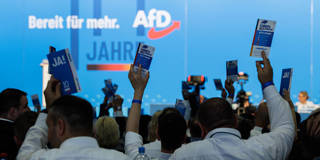Germany’s far-right Alternative für Deutschland has always been a party for those who are unhappy with the status quo, a party that opposes and criticizes, but stands for little. Today, however, it is riding high in opinion polls, its leaders hungrier for power the closer they get to it, and Germany’s political mainstream is largely to blame.
BERLIN – Over the last two years, Germany’s largest far-right party, the Alternative für Deutschland (AfD), has managed to consolidate the numerous splinter groups that comprise the country’s long-unsettled nationalist fringe. Defying its reputation for infighting and frequent leadership turnovers, the AfD has come to be dominated by a single figure, Björn Höcke. While Germany’s political mainstream still treats the party as a pariah, the AfD is seeking to present itself as a united force ready to take on government responsibilities.

BERLIN – Over the last two years, Germany’s largest far-right party, the Alternative für Deutschland (AfD), has managed to consolidate the numerous splinter groups that comprise the country’s long-unsettled nationalist fringe. Defying its reputation for infighting and frequent leadership turnovers, the AfD has come to be dominated by a single figure, Björn Höcke. While Germany’s political mainstream still treats the party as a pariah, the AfD is seeking to present itself as a united force ready to take on government responsibilities.